These low-tech stocks have good yields and strong stock buyback programs. These features can help provide good returns to investors by providing a buffer on the downside and acting as a catalyst on the upside.
Many of these kinds of stocks are in cyclical industries like manufacturing, mining, farming and construction.
The point is, these stocks all now reflect the huge possibility of a recession. The Federal Reserve is g0ing to keep tightening until inflation abates. They seem intent on slowing down the economy. But these stocks already priced in a huge portion of that bad news.
That makes this an ideal time to begin accumulating a position using a dollar-cost averaging method. You should use dollar-cost averaging because you can’t always be sure you are buying at the bottom.
Moreover, these companies all pay dividends to their shareholders. Therefore, investors can be patient until the underlying value of the company’s fundamentals emerges.
In addition, buyback programs help the companies soak up weak sellers’ shares and provide a higher dividend per share for the same cost.
Let’s dive in and look at these low-tech stocks to buy:
| CMI | Cummins | $194.11 |
| AVT | Avnet | $42.27 |
| CAT | Caterpillar | $178.29 |
| NUE | Nucor | $105.64 |
| AGCO | AGCO Corporation | $100.62 |
| TTC | the Toro Company | $76.95 |
Low-Tech Stocks to Buy: Cummins (CMI)
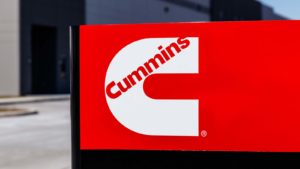
Dividend Yield: 3%
Cummins (NYSE:CMI) is a diesel and natural gas engine manufacturer whose stock is very cheap now — trading with a 3% dividend yield and 11x this year’s earnings forecast or just over 1x this year’s sales. For next year, the price-to-earnings multiple falls to 9.6x, given an earnings growth rate of 14.5% for 2023.
On top of that Cummins made it clear in its first-quarter earnings statement that it intends to pay out 50% of all its operating cash flow in both dividends and buybacks. That will directly help investors.
For example, for the 12 months ending March 31, Cummins produced $2.081 billion in operating cash flow. That implies that over $1.04 billion will be paid out to shareholders going forward.
So, given that its market capitalization as of Friday’s close was $27.3 billion, that means that 3.8% of its market value will be paid out in the coming year. That is likely good enough to help the stock to stay fairly steady.
For example, year-to-date (YTD) through Friday, CMI stock is down just 11.6%. That is a lot better than the S&P 500, which is down 20.2% for the same span, based on the SPDR S&P 500 Trust ETF (NYSEARCA:SPY).
That makes this one of the best low-tech stocks to buy going forward.
Avnet (AVT)
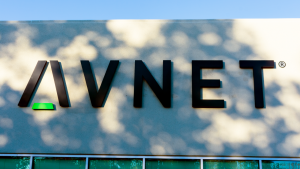
Dividend Yield: 2.5%
Avnet (NASDAQ:AVT) is an electronics distributor with a nominal growth rate forecast for the next year. Seeking Alpha shows that nine analysts project its EPS will rise nominally from $6.85 this year to $6.98 next year.
But at $42.27 per share as of June 30, the stock has a low 6.1x multiple of earnings for 2023. That is very inexpensive, especially since Avnet is making profits.
Moreover, AVT pays an annual dividend of $1.04 giving it a 2.5% dividend yield. It also has plenty of FCF to cover the dividend. For example, last quarter ending April 30 it produced $232.2 million in FCF. That covered its dividend payment of $25.6 million as well as share repurchases of $43.4 million.
This makes AVT stock one of the better low-tech stocks to buy in this shaky economic environment.
Caterpillar (CAT)
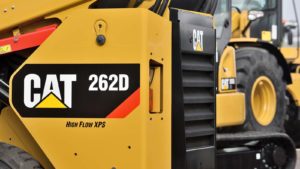
Dividend Yield: 2.7%
Caterpillar (NYSE:CAT) is a heavy machinery and equipment manufacturer that trades for just 14.4 times 2023 forward earnings. Moreover, earnings are forecast to rise 17.4% from 2022 to 2023, to $14.59 per share. That puts it on a cheap forward P/E of just 12.2x.
Moreover, Caterpillar pays an annual dividend of $4.80 per share. That gives it a healthy 2.7% dividend yield. That also puts its payout ratio at just 39%, a very low ratio showing that earnings more than cover the dividend.
Moreover, the company’s cash flow is strong and Caterpillar is buying back its shares. For example, it spent $0.8 billion on buybacks last quarter. That works out to an annual rate of $3.2 billion, or 3.27% of its $97.86 billion market capitalization.
That brings its total yield to shareholders (dividends plus buybacks) to almost 6%. That makes it one of the better low-tech stocks to buy now.
Nucor (NUE)
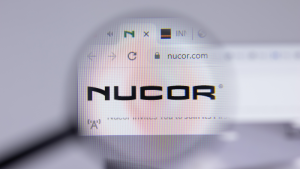
Dividend Yield: 1.9%
Nucor (NYSE:NUE) produces hot-rolled, cold-rolled and galvanized sheet steel products. It’s in a highly cyclical industry. But that makes the stock very cheap now.
For example, it pays an annual dividend of $2 per share. At its June 30 closing price of $105.64, this gives it a strong 1.9% dividend yield.
Even though its 2023 earnings per share (EPS) are forecast to drop over 57% next year, at $11.58 for 2023, those earnings still more than cover the $2 dividend. It puts the stock on a low 9.1x earnings forecast for next year.
Moreover, Nucor said recently that its earnings for Q2 will be a record at between $8.75 and $8.85 per diluted share. It said its steel mills segment earnings are expected to strengthen due primarily to increased profitability at some of its mills.
In addition, Nucor has a strong share buyback program. It said it has already bought back $1.7 billion in shares in the first half, which represents 6% of its market cap in just six months. That puts it on a run rate to buy back 12% of its shares annually.
That alone can act as a significant catalyst for both the stock price and an increase in its dividend per share.
AGCO Corp (AGCO)
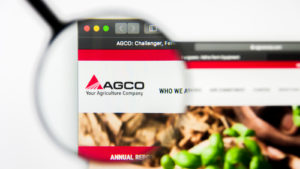
Dividend Yield: 1%
AGCO Corporation (NYSE:AGCO) is a $7.54 billion market cap manufacturer and distributor of agricultural equipment. Right now it pays an annual 96-cent dividend, putting the stock on a dividend yield of 1%.
Moreover, AGCO is forecast to show 11% earnings growth next year to $13.15 per share. This means at $100.62 as of June 30 it trades for less than 7.65x earnings for 2023.
In addition, AGCO has been paying a “variable” special dividend annually. Last quarter it paid a $4.50 special dividend, worth 4.47% of the stock price today. This is the second time in a row that AGCO has paid out the special dividend annually. That helps make this one of the strong dividend low-tech stocks to buy on this list.
The Toro Company (TTC)

Dividend Yield: 1.6%
The Toro Company (NYSE:TTC) makes and sells turf and landscape equipment and ice management products worldwide. It pays out a dividend of $1.20 annually, which puts it on a dividend yield of 1.6%. That is more than covered by its earnings forecast of $4.09 this year and $4.82 forecast for 2023.
It also means TTC stock is cheap at just $76.95 as of June 30, putting it on a 16x P/E multiple for next year. Moreover, TTC bought back $75 million of its shares in the last six months, putting it on a $150 million share buyback run rate. That works out to 1.88% of its $7.96 billion market cap.
Therefore, between its 1.6% dividend yield and the 1.88% buyback yield, shareholders are getting a total yield of 3.48% annually. That will help the stock stay fairly steady this year.
On the date of publication, Mark Hake did not hold (either directly or indirectly) any positions in the securities mentioned in this article. The opinions expressed in this article are those of the writer, subject to the InvestorPlace.com Publishing Guidelines.
